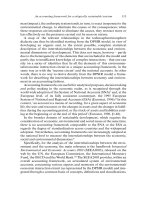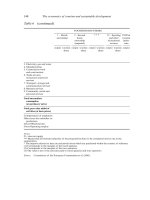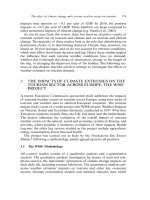THE ECONOMICS OF MONEY,BANKING, AND FINANCIAL MARKETS 193
Bạn đang xem bản rút gọn của tài liệu. Xem và tải ngay bản đầy đủ của tài liệu tại đây (46.47 KB, 1 trang )
CHAPTER 7
Stocks, Rational Expectations, and the Efficient Market Hypothesis
4. The efficient market hypothesis indicates that hot tips,
investment advisers published recommendations,
and technical analysis cannot help an investor outperform the market. The prescription for investors is
to pursue a buy-and-hold strategy purchase stocks
and hold them for long periods of time. Empirical
evidence generally supports these implications of the
efficient market hypothesis in the stock market.
5. The stock market crash of 1987 and the tech crash of
2000 have convinced many financial economists that
the stronger version of the efficient market hypothesis, which states that asset prices reflect the true fundamental (intrinsic) value of securities, is not correct.
It is less clear that the stock market crash shows that
161
the weaker version of the efficient market hypothesis is wrong. Even if the stock market was driven by
factors other than fundamentals, these crashes do
not clearly demonstrate that many of the basic
lessons of the efficient market hypothesis are no
longer valid, as long as these crashes could not have
been predicted.
6. The new field of behavioural finance applies concepts from other social sciences like anthropology,
sociology, and particularly psychology to understand the behaviour of securities prices. Loss aversion, overconfidence, and social contagion can
explain why trading volume is so high, stock prices
get overvalued, and speculative bubbles occur.
KEY TERMS
adaptive expectations,
arbitrage,
behavioural finance,
bubble,
p. 147
p. 153
p. 159
p. 159
cash flows,
dividends,
p. 141
p. 141
efficient market hypothesis,
p. 150
error-learning hypothesis,
p. 148
residual claimant,
p. 141
generalized dividend model, p. 142
shareholders, p. 141
Gordon growth model,
short sales,
market fundamentals,
optimal forecast,
p. 143
p. 154
p. 148
price earnings ratio (PE),
p. 144
rational expectations, p. 147
p. 160
theory of efficient capital markets,
p. 150
unexploited profit opportunity,
p. 153
QUESTIONS
1. What basic principle of finance can be applied to
the valuation of any investment asset?
tions of the driving time are perfectly accurate.
Considering that it snows only once every ten years
where Joe lives, Joe s expectations are almost
always perfectly accurate. Are Joe s expectations
rational? Why or why not?
*2. Identify the cash flows available to an investor
in stock. How reliably can these cash flows be
estimated? Compare the problem of estimating stock
cash flows to estimating bond cash flows. Which
security would you predict to be more volatile?
*6. If a forecaster spends hours every day studying data
to forecast interest rates but his expectations are not
as accurate as predicting that tomorrow s interest
rate will be identical to today s interest rate, are his
expectations rational?
3. Some economists think that the central banks
should try to prick bubbles in the stock market
before they get out of hand and cause later damage
when they burst. How can monetary policy be used
to prick a bubble? Explain how it can do this using
the Gordon growth model.
7. If stock prices did not follow a random walk, there
would be unexploited profit opportunities in the
market. Is this statement true, false, or uncertain?
Explain your answer.
You will find the answers to the questions marked with
an asterisk in the Textbook Resources section of your
MyEconLab.
*4. Forecasters predictions of inflation are notoriously
inaccurate, so their expectations of inflation cannot
be rational. Is this statement true, false, or uncertain? Explain your answer.
5. Whenever it is snowing when Joe Commuter gets
up in the morning, he misjudges how long it will
take him to drive to work. Otherwise, his expecta-
*8. Suppose that increases in the money supply lead to
a rise in stock prices. Does this mean that when you
see that the money supply has had a sharp rise in
the past week, you should go out and buy stocks?
Why or why not?
*9. If I read in the Globe and Mail: Report on Business
that the smart money on Bay Street expects stock
prices to fall, should I follow that lead and sell all
my stocks?









